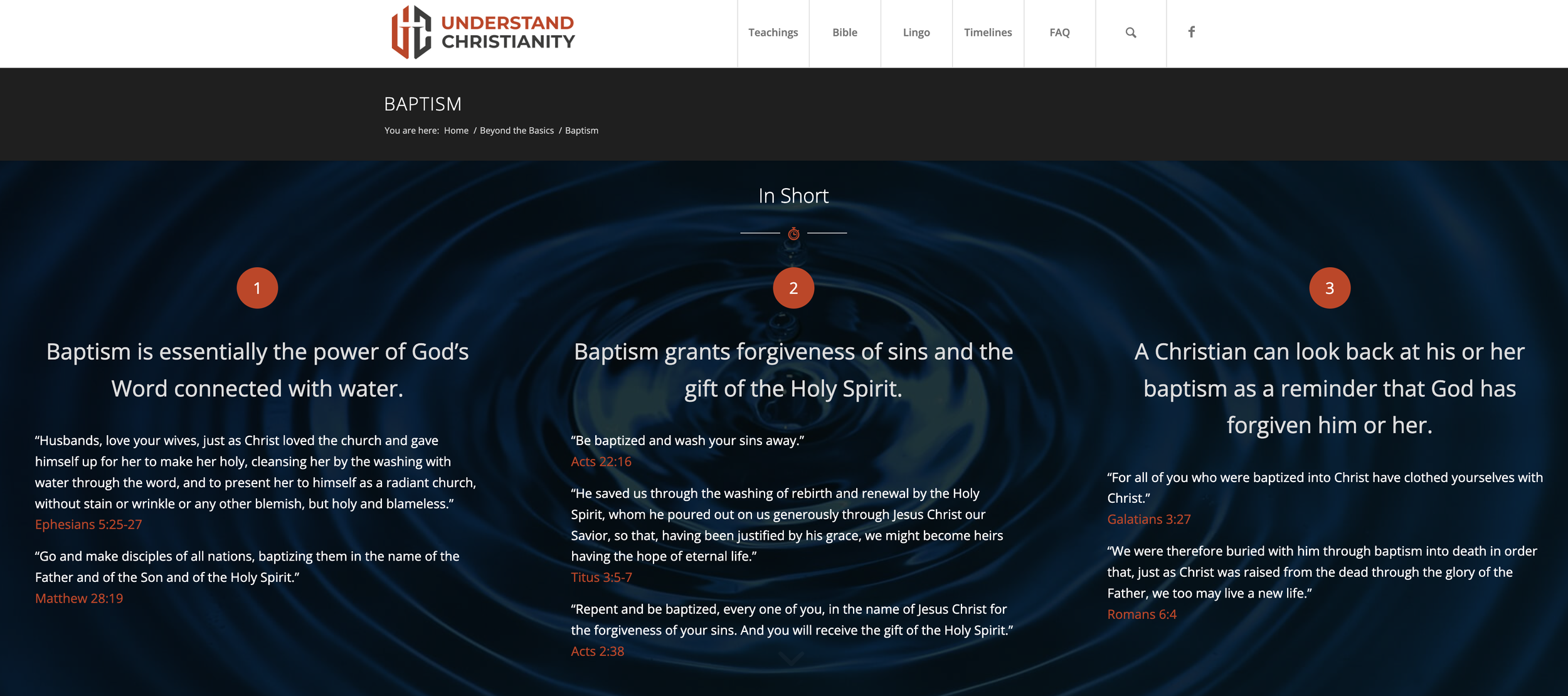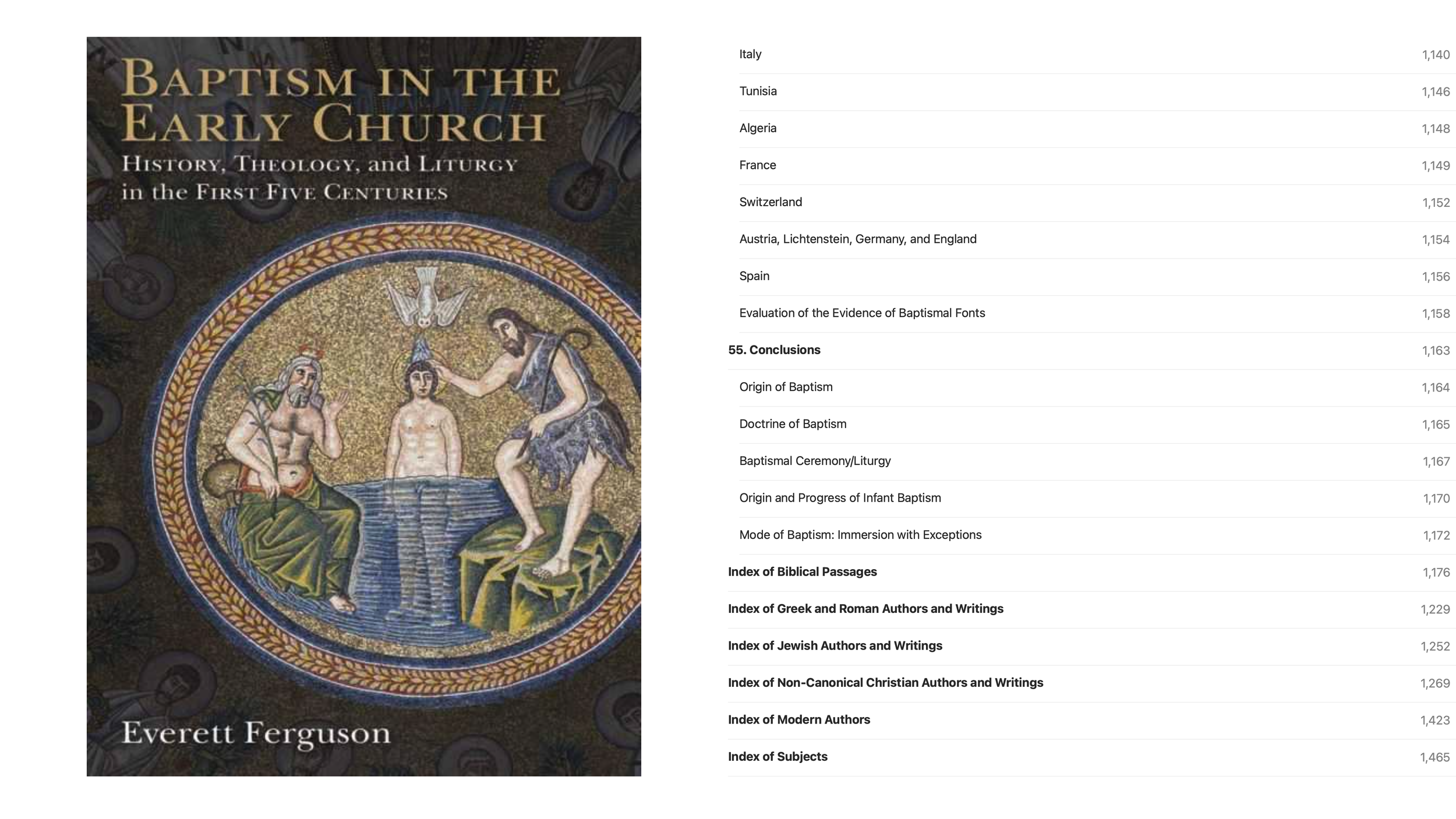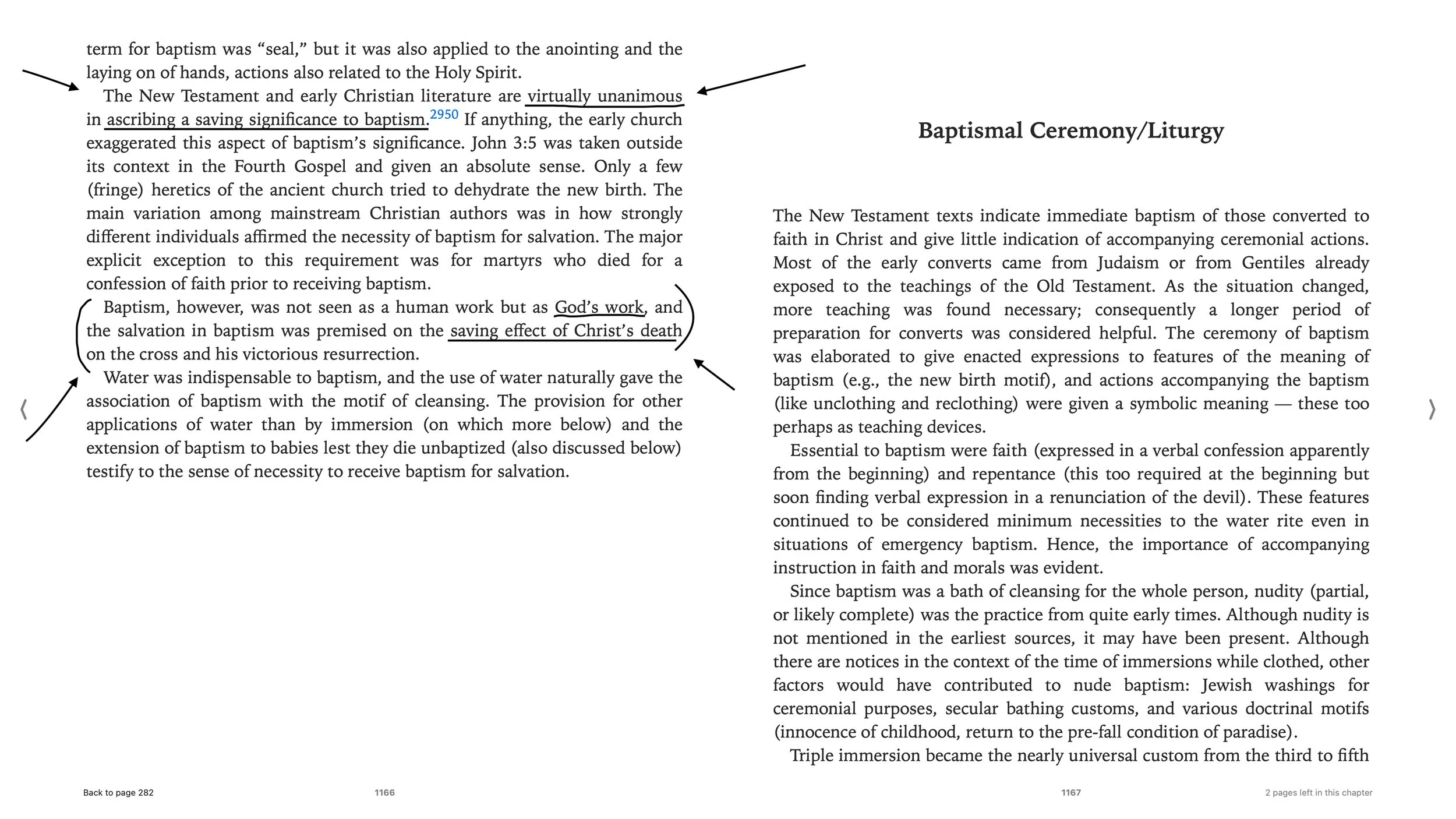The topic of Christian Baptism is, unfortunately, controversial. There seems to be little room for thoughtful discussion in the minds of many Evangelicals, but we hope the ideas here will help you think about a biblical perspective on Baptism.
Here are some catchphrases and common arguments that get used more often than the Bible itself to understand Baptism:
“Baptism is an outward sign of an inward change.”
“Baptism is a symbolic act that tells the world about your commitment to follow Christ.”
“We are saved by faith, not by works, and baptism is a work so it cannot save us.”
“Baptism doesn’t save. Jesus does.”
“We are saved by Faith Alone. Once you add Baptism it’s now Faith Alone plus something else!"
“Children must reach the ‘Age of Accountability’ before they can accept Christ. They can get Baptized only after they are old enough to make a decision for themselves.”
“Infants and young children cannot have faith, and God cannot give them faith until they reach the ‘Age of Accountability.’”
“The thief on the cross did not get Baptized and Jesus told him that he would go to heaven, so Baptism cannot be connected to salvation.”
“I know a guy who was Baptised as a baby and he’s not a Christian anymore, so Baptism doesn’t do anything.”
Now here are some Bible verses that often get twisted around to mean something other than what they say:
“Truly, truly, I say to you, unless one is born of water and the Spirit, he cannot enter the kingdom of God”
“And Peter said to them, ‘Repent and be baptized every one of you in the name of Jesus Christ for the forgiveness of sins, and you will receive the gift of the Holy Spirit.”
“And now why do you wait? Rise and be baptized and wash away your sins, calling on his name.’”
“We were buried therefore with him by baptism into death, in order that, just as Christ was raised from the dead by the glory of the Father, we too might walk in newness of life.”
“Because they formerly did not obey, when God’s patience waited in the days of Noah, while the ark was being prepared, in which a few, that is, eight persons, were brought safely through water. Baptism, which corresponds to this, now saves you, not as a removal of dirt from the body but as an appeal to God for a good conscience, through the resurrection of Jesus Christ, who has gone into heaven and is at the right hand of God, with angels, authorities, and powers having been subjected to him.”
“For as many of you as were baptized into Christ have put on Christ.”
“In him also you were circumcised with a circumcision
made without hands, by putting off the body of the flesh, by the
circumcision of Christ, having been buried with him in baptism, in which
you were also raised with him through faith in the powerful working of God,
who raised him from the dead.”
“But when the goodness and loving kindness of God our Savior appeared, he saved us, not because of works done by us in righteousness, but according to his own mercy, by the washing of regeneration and renewal of the Holy Spirit, whom he poured out on us richly through Jesus Christ our Savior, so that being justified by his grace we might become heirs according to the hope of eternal life.”
“Whoever believes and is baptized will be saved, but whoever does not believe will be condemned.”
“Husbands, love your wives, as Christ loved the church and gave himself up for her, that he might sanctify her, having cleansed her by the washing of water with the word...”
Amazingly, even after reading through all of these verses about Baptism the typical Evangelical/Baptist question is:
“So you’re saying that unless a person is Baptized they’re going to hell?!” or
“So you’re saying that we are saved by works?!” or
“So you believe in faith+works?!” or
“So you believe Baptism is absolutely essential for salvation?!”
The anger directed towards a plain reading of God’s Word is puzzling, at best. Instead of looking at these Bible passages as a positive thing, it seems that too many people want to find out how these verses can’t mean what they appear to be saying. Why do Bible-believing Christians look for an “escape clause” when they get to these passages about Baptism?
Lutheran theology is simply trying to say only what the Bible says. And, no, Lutherans don’t teach that Baptism is absolutely essential for salvation. Here’s what the Small Catechism says:
“Question: Is it possible for an unbaptized person to be saved? Answer: It is only unbelief that condemns. Faith cannot exist in the heart of a person who despises and rejects Baptism against better knowledge. But those who believe the Gospel, yet die before they have an opportunity to be baptized are not condemned.”
But here are some tough questions for everyone who believes that Baptism is a symbol that doesn’t do anything:
Where are all of the Bible verses that say: “Baptism is a symbol?”
Where are all of the Bible verses that say: “Baptism is an act of obedience?”
Where are all of the Bible verses that say: “Baptism is a good work and, therefore, it has no connection to salvation?”
Where are all of the Bible verses that say: “A person must reach the Age of Accountability before they can make a decision to become a Christian and then they can get baptized?”
Where are all of the Bible verses that say: “Baptism doesn’t do anything-it’s an outward sign of an inward change?”
A lot of people seem to be saying: “Roman Catholics are totally wrong about Baptism and Lutherans sound a lot like them, so Lutherans must be wrong, too.” This is not fair to Lutherans who have carefully considered & documented their theological differences with Roman Catholic theology over a period of about 50 years, leading to the Book of Concord in 1577.
This highly recommended website, called “Understand Christianity,” has this very helpful section about Baptism: Understand Christianity-Baptism:
Here is the exact Lutheran teaching on Baptism from the “Small Catechism” from the Book of Concord website, which has all of the Lutheran teachings (or “confessions”) in one place.
The following is the section on Holy Baptism from Luther’s Small Catechism:
The Sacrament of Holy Baptism
As the head of the family should teach it in a simple way to his household.
First.
What is Baptism?
–Answer: Baptism is not simple water only, but it is the water comprehended in God’s command and connected with God’s Word.
Which is that word of God?
–Answer: Christ, our Lord, says in the last chapter of Matthew: “Go ye into all the world and teach all nations, baptizing them in the name of the Father, and of the Son, and of the Holy Ghost.” (Matthew 28:19)
Secondly.
What does Baptism give or profit?
–Answer: It works forgiveness of sins, delivers from death and the devil, and gives eternal salvation to all who believe this, as the words and promises of God declare.
Which are such words and promises of God?
–Answer: Christ, our Lord, says in the last chapter of Mark: “He that believeth and is baptized shall be saved; but he that believeth not shall be damned.” (Mark 16:16)
Thirdly.
How can water do such great things?
–Answer: It is not the water indeed that does them, but the word of God which is in and with the water, and faith, which trusts such word of God in the water. For without the word of God the water is simple water and no baptism. But with the word of God it is a baptism, that is, a gracious water of life and a washing of regeneration in the Holy Ghost, as St. Paul says, Titus, chapter three: By the washing of regeneration and renewing of the Holy Ghost, which He shed on us abundantly through Jesus Christ, our Savior, that, being justified by His grace, we should be made heirs according to the hope of eternal life. This is a faithful saying. (Titus 3:5-7)
Fourthly.
What does such baptizing with water signify?
–Answer: It signifies that the old Adam in us should, by daily contrition and repentance, be drowned and die with all sins and evil lusts, and, again, a new man daily come forth and arise; who shall live before God in righteousness and purity forever.
Where is this written?
–Answer: St. Paul says in Romans, chapter 6: “We are buried with Christ by Baptism into death, that, like as He was raised up from the dead by the glory of the Father, even so we also should walk in newness of life.” (Romans 6:4)
In short, Lutheran teaching on Baptism tries to say only what the Bible says! It also tries to stay in line with the historic teaching that Christians have believed since the days of the early church while correcting for unbiblical ideas that came from the Roman Catholic church. The early Christian church did not believe that Baptism was merely a symbol of a person’s decision to become a Christian.
Perhaps the most crucial foundational teaching where Lutheran theology challenged the Roman Catholic Church is this:
“Our churches teach that people cannot be justified before God by their own strength, merit or works. People are freely justified for Christ’s sake, through faith, when they believe that they are received into favor and that their sins are forgiven for Christ’s sake. By His death, Christ made satisfaction for our sins. God counts this faith for righteousness in His sight.”
Here are some key ideas that may help you consider the Lutheran (and biblical!) understanding of Baptism:
Baptism is a tangible way for God to “give the Gospel” to guilty sinners, but it is not the only way.
Baptism is meant to assure the guilty sinner that their sins are truly forgiven, in spite of how the baptized Christian might feel about their spiritual progress.
Baptism happens “outside of us” in order that our inward feelings don’t determine our justification.
Whether we “feel” forgiven or not, our Baptism can be viewed as an event that took place and we can remember it in times of personal doubt.
Baptism is not in opposition to faith and it isn’t a replacement for faith.
Baptism is not a way for Christians to assure themselves that continued, willful sinning is acceptable.
Baptism is not a “shortcut” to justification that allows us to ignore all of the other aspects of our Christian faith.
Let’s look at what Distinguished Scholar in Residence, from Abilene Christian University, Everett Ferguson, has to say in his incredibly comprehensive book: “Baptism in the Early Church-History, Theology, and Liturgy in the First Five Centuries:”
(This is the cover and last part of the index, which shows how extensive this book is.)
Let’s look at the objective conclusions near the end of this book:
Here’s a terrific article about Baptism from Pastor Matt Richard: Why Baptisms Are Violent (A Lutheran View of Baptism)
Here’s an extensive series of videos: A Comprehensive Teaching on Baptism from Pastor Chris Rosebrough
Here’s an extensive essay from Pastor Robert Harting: “Baptized Into Christ-For Life”
Here’s a recent sermon from Pastor Chris Rosebrough: Baptismal Exchange
Here’s an article and podcast: Biblical Case for the Lutheran Doctrine of Baptism by Pastor Chris Rosebrough
Here’s Chris Rosebrough’s extensive paper: What the Bible Teaches About Baptism & How the Earliest Christians Understood These Biblical Texts
Here’s a playlist of videos on the topic:
Here are some articles on the topic of Infant Baptism:
Why SHOULD We Baptize Infants? From Pastor Tom Eckstein, Concordia Lutheran Church, Jamestown, North Dakota
Why Do We Baptize Babies If They Cannot Make a Profession of Faith? From Alex Fogleman at the Anglican Compass
A Brief Defense of Infant Baptism From Pastor Kevin DeYoung at the Gospel Coalition
FAQs about Baptism from the LCMS (Lutheran Church Missouri Synod)
FAQs about Baptism from the WELS (Wisconsin Evangelical Lutheran Church)
How I Changed My Mind about Infant Baptism From Dr. Liam Goligher at Tenth Presbyterian Church, Philadelphia, PA



